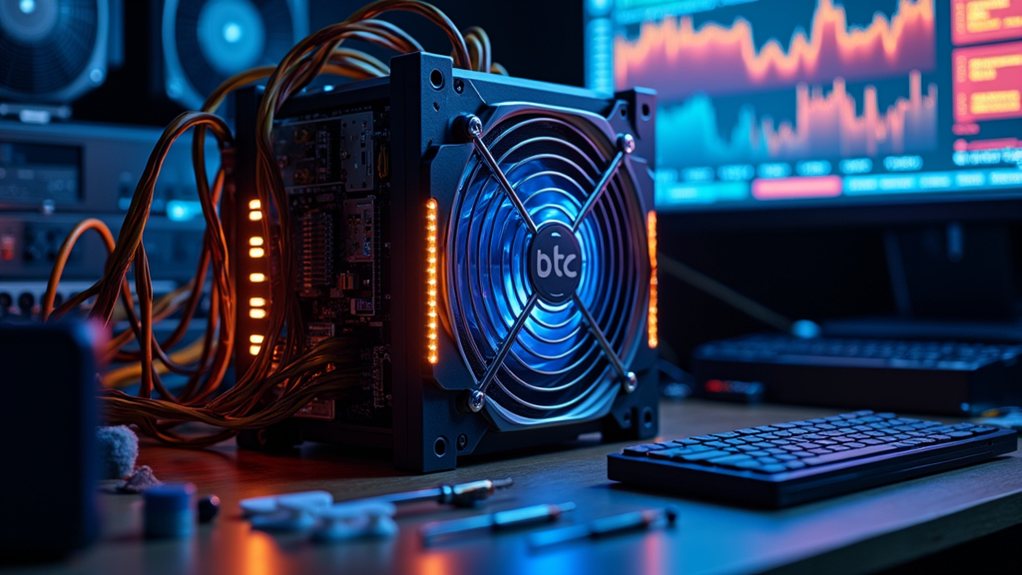Private keys are cryptographic passwords controlling cryptocurrency assets. They're 256-bit alphanumeric strings that can't be reset—lose them, kiss your money goodbye. These digital signatures authenticate ownership while keeping your identity secure during transactions. Storage options include hardware wallets (best), software wallets, or paper backups. Never share them. Period. Smart users encrypt everything and maintain multiple backups in different locations. The blockchain world doesn't offer password resets or customer service for careless mistakes.

While most people enjoy the convenience of digital transactions, few understand the cryptographic backbone that makes them possible. Private keys sit at the heart of this system. They're not complicated, really—just 256-bit alphanumeric strings that give you complete control over your cryptocurrency assets. Think of them as super-secure passwords that can't be reset. Ever. Lose that string of characters, and you've lost your money. Period.
These cryptographic codes work alongside their more extroverted counterparts, public keys. The relationship is mathematical and unbreakable with current technology. Your private key signs transactions, proving ownership without revealing the key itself. Pretty clever, actually. The system allows you to send Bitcoin or Ethereum to someone across the world without a bank or intermediary. No permission needed.
Creating a private key isn't something humans do well. Random number generators handle this job, producing strings virtually impossible to guess. Once generated, storage becomes the big question. Software wallets are convenient but vulnerable to online threats. Hardware wallets—small physical devices that store keys offline—offer better protection. Paper wallets work too, if you don't mind going analog. Many users rely on seed phrases, human-readable versions that can recreate a lost key. The most secure approach is to keep your private keys completely offline, protecting them from potential network-based attacks. Non-custodial wallets give users censorship resistance and the freedom to manage their crypto assets without third-party restrictions.
The security rules are simple. Don't share your private key. With anyone. Ever. Encrypt digital storage. Back up key information regularly. Store copies in different locations. Private keys must be frequently rotated to minimize the risk of compromise during long-term storage. Hackers develop increasingly sophisticated methods to steal these keys, from basic phishing to complex malware. They know what's at stake. Your entire crypto fortune can be transferred in seconds, with no recourse.
Never share your private key. Encrypt everything. Back up regularly. One security slip and your crypto vanishes forever.
Different blockchain networks implement private keys differently. Bitcoin uses the Elliptic Curve Digital Signature Algorithm. Ethereum supports multiple signature approaches. Some networks use deterministic wallet generation, creating predictable keys from a single seed. Cross-chain compatibility issues sometimes arise from these differences. Not every key works everywhere.
The future of private keys looks interesting. Quantum computing threatens current encryption methods, pushing research toward quantum-resistant alternatives. Biometric authentication may soon complement traditional key storage. More user-friendly management solutions are emerging to reduce the technical barriers. Because let's face it—most people can't handle long strings of random characters.
Private keys represent both the strength and weakness of decentralized finance. They provide security and autonomy unmatched by traditional banking, yet their unforgiving nature creates risks that traditional systems don't have. No customer service to call. No password reset option. Just you, responsible for your financial sovereignty. Ready or not.
Frequently Asked Questions
Can a Quantum Computer Crack My Private Key?
Quantum computers can't crack private keys yet. Not even close.
Today's quantum machines are basically fancy science experiments with 433 qubits. Experts say they'd need 4000+ to threaten cryptography.
Shor's algorithm could theoretically break RSA and elliptic curve encryption, but we're looking at 10-15 years before real danger emerges.
Meanwhile, NIST is already developing quantum-resistant alternatives. The race is on.
How Often Should I Generate New Private Keys?
Private key rotation depends on risk factors. Most experts recommend yearly changes. High-value keys? Rotate more often. Low-risk scenarios? Maybe every 2-3 years.
Regulatory requirements matter too. PCI DSS has specific timeframes.
And let's be real—if there's any hint of compromise, rotate immediately. No exceptions.
Automated systems make this easier. Manual rotation? What a pain.
But security isn't supposed to be convenient.
What Happens if a Company Storing My Private Key Goes Bankrupt?
If a company storing private keys goes bankrupt, customer assets may be frozen during proceedings. Not great.
Bankruptcy courts determine who gets what, when. Customer funds should be segregated, but reality's often messier. Records might be incomplete, commingled, or—worse—lost entirely.
Crypto-specific bankruptcy laws are still evolving, so outcomes vary widely. Customers typically face significant delays and uncertainty.
Sometimes assets are eventually returned; sometimes they're gone forever.
Are Hardware Wallets Completely Immune to Remote Hacking Attempts?
No, hardware wallets aren't completely immune to remote attacks. Nothing is.
They're considerably safer than software wallets, sure. But they still face risks from supply chain compromises, malicious firmware updates, and sophisticated side-channel attacks.
Their main security advantage? Keeping private keys offline. That's huge.
But "completely immune"? That's fantasy talk. Security is always relative, never absolute. Even the best defenses have weaknesses.
Can Private Keys Be Legally Seized by Government Authorities?
Yes, private keys can be legally seized by government authorities. Law enforcement needs proper warrants or court orders first. They obtain keys through device seizures, court-compelled disclosure, or exchange cooperation. Civil forfeiture doesn't even require a conviction.
The feds face challenges though. Encryption is tough. Cold storage complicates things. Constitutional questions exist around self-incrimination.
Once seized, the US Marshals typically auction the crypto. Proceeds fund law enforcement or victim compensation.








